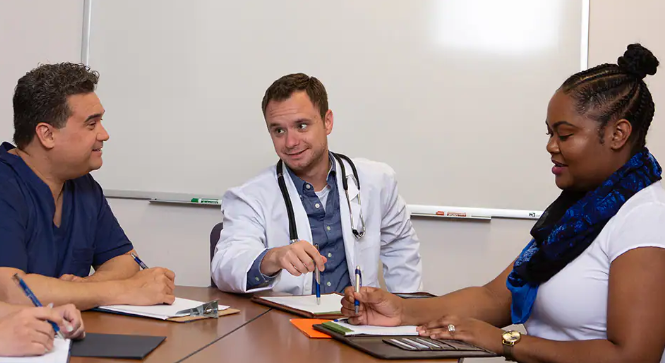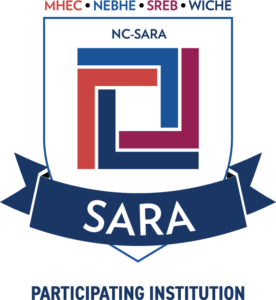The Associate of Applied Science in Healthcare Management provides foundational skills in the areas of healthcare management, accounting, healthcare law, and the student-chosen healthcare specialty. The program is designed for students who seek to acquire complete framework in entry-level healthcare concepts. The Associate of Applied Science in Healthcare Management provides foundational skills in the areas of healthcare management, accounting, healthcare law, and the student-chosen healthcare specialty. The program is designed for students who seek to acquire a complete framework in entry-level healthcare concepts. Learners will acquire the skills and knowledge applicable to their chosen healthcare professions. Upon completion of this program, graduates are eligible to sit for the national Certified Professional Coder exam and other national licensure exams. Upon completion of this program, graduates are eligible to sit for the national Certified Professional Coder exam and other national licensure exams.

This course provides an overview and exploration of the organization of American government, which includes an overview of the historical significance of the Constitution; the Bill of Rights; Congress; the Supreme Court; the Presidency; political parties and interest groups. This course is an introduction to political science.
This course explores introductory information related to the US healthcare industry. Students learn about the intricacies of healthcare as well as the breadth of professions within the healthcare industry.
Healthcare legal structure is the foundation of its operations and much more. This course explores healthcare corporations, types of legal entities, and the relevance of each type. Students learn the introductory navigation within the healthcare industry. This course also provides the entry-level legal language of business. This course also discusses ethics in business.
This course is designed to introduce biology at an entry level by examining the hierarchy that ranges from the fundamentals of cell biology to the physiology of organisms, and the interactions among those organisms in their environment.
This course is a basic review of mathematical and quantitative skills, including terminology, checking accounts, taxes, payroll, step-by-step approaches. This assists in developing math skills used in personal and business applications.
This introductory course explores the writing skills to include mechanics, effective writing, organization and essays. The course ends with a final paper where students demonstrate their newly acquired writing skills.
This course focuses on the execution of workflows, retrieving patient information and types of electronic healthcare records systems. Students learn the basics of record keeping as well as their future legal requirements.
This course is an introduction to the human resources field and its key elements. The course outlines the roles and functions of members of the human resources department, as well as educating others outside human resources, in how their roles include human resources-related activities.
This course focuses on the principles of communication to include oral and written language. Students learn the significance of culture and other factors and how they relate to communication.
This course in the introduction to anatomical and physiological features of the body systems. Students focus on multiple systems including blood, cardiovascular, renal, digestive, and endocrine.
This course introduces fundamental computer skills as well as software commonly used in business operations. It involves hands-on assignments including operating systems, computer components, word processing, spreadsheets, presentation graphics, ends with a final project.
This course presents the theories and principles of modern psychology. Students learn about the different branches of psychology and the practical application of psychological tenets to functional behavior.
This course is designed to introduce you to the basic principles of marketing touching on specific healthcare marketing techniques. It focuses on distribution, financing, marketing information systems, pricing, product/service management, promotions, and selling using common marketing practices we well as exploration of the industry
This is a survey course in data analytics, informatics, and statistics. Students learn the necessary mathematical skills to properly analyze data and tell the story of what the data is telling them. This course focuses on healthcare data and provides students an opportunity to apply statistics to real-life healthcare data case studies.
This course focuses on the processing of information through computers and other intelligent devices. The knowledge acquired in this course provides a foundation for intelligently analyzing managerial decisions.
This course explores human behavior in organizations using psychology and sociology principles. The content discuss the implications of human behavior for business organizations. Issues pursued in this course include group dynamics, communications, motivation, leadership, and decision making as well as organizational design, culture, development and change. The discipline of Organizational Behavior is unique in its combined goals of seeking organizational success while advocating employee empowerment.
This course is designed to introduce students to the healthcare terminology, concepts, and practices and the science of management. Students learn the fundamentals of healthcare management as well as how to apply it in real-life settings.
This course is an introduction to the preparation and analysis of business financial statements. Specific topics include the accounting model, general purpose financial statements and accounting for assets, liabilities, and equity.
This course introduces learners to international healthcare delivery and highlights similarities and differences between delivery systems. . Specific topics include determining cash flows, international accounting, product costing, budgeting and other concepts of management accounting.
This course is designed as an introduction to the study of the human communication process with an emphasis on effective public communication. The course includes intensive practice in public speaking, reasoning, critical thinking, and critical listening. It is an essential general education course teaching effective use and understanding of written and spoken forms of communication.
⦁ Institutionally Accredited by: The Council on Occupational Education (COE) https://council.org/
⦁ Licensed by: The Louisiana Board of Regents
Graduates of the Associate of Applied Science in Healthcare Management are eligible to sit for two nationally recognized license exams.
National License Exam Options:
1. Certified Professional Coder (CPC)
a. The Certified Professional Coder (CPC) exam is the conclusive step to attaining CPC certification—renowned throughout the world of healthcare as the gold standard for physician-based medical coding. By passing the CPC exam and earning the right to append the CPC acronym to your name, you become a healthcare business professional recognized for reliable mastery of professional-fee medical coding.
b. Average Salary Range: $45,176 to $51,840 (Bureau of Labor & Statistics, 2020)
1. Electronic Health Records Specialist Certification (CEHRS)
a. The security, completeness and accuracy of patient data are critical. The Electronic Health Records Specialist Certification (CEHRS) is often combined with other NHA credentials to expand an employee’s skill set, making them a valuable asset to their employers.
b. Average Salary Range: $45,176 to $51,840 (Bureau of Labor & Statistics, 2020)
Infinity College works with PioneerRx to provide an enhanced, hands-on experience to our curriculum. With the nation’s top pharmacy software, our students can apply their knowledge to real-world situations that normally occur in a pharmacy. Learn more at https://www.pioneerrx.com /web/

Copyright © Infinity College. All rights reserved.